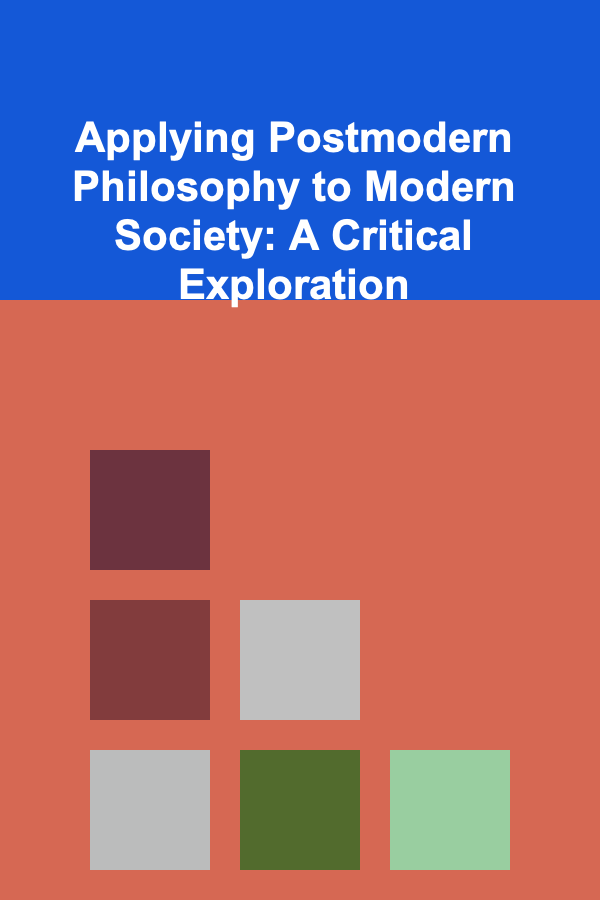
Applying Postmodern Philosophy to Modern Society: A Critical Exploration
ebook include PDF & Audio bundle (Micro Guide)
$12.99$5.99
Limited Time Offer! Order within the next:

Postmodern philosophy, a complex and often misunderstood intellectual movement, emerged in the latter half of the 20th century as a critical response to the perceived failures and limitations of modernism. While often associated with skepticism, relativism, and deconstruction, postmodernism offers valuable tools for understanding and navigating the complexities of modern society. This essay will delve into key tenets of postmodern thought and explore how they can be applied to contemporary issues, fostering critical thinking, social justice, and a more nuanced understanding of the world.
Understanding Postmodernism: Key Concepts
Before exploring the applications of postmodernism, it's crucial to understand its core principles. Some of the most important concepts include:
1. The Rejection of Metanarratives
Modernism, with its emphasis on reason, progress, and universal truths, often relied on grand, overarching narratives (metanarratives) to explain history, society, and human existence. Think of Marxism with its historical materialism, or Enlightenment narratives of inevitable progress driven by reason and science. Postmodernism, however, rejects these metanarratives as totalizing and often oppressive. It argues that these grand stories are inherently exclusionary, silencing alternative voices and perspectives. Lyotard, in his seminal work *The Postmodern Condition*, defined postmodernism as "incredulity toward metanarratives." This incredulity stems from a recognition that these narratives often serve the interests of dominant groups and fail to account for the diverse and fragmented experiences of individuals and communities.
In practical terms, this means questioning claims of universal truth or objective knowledge. Instead of accepting pronouncements from authority figures or established institutions at face value, postmodernism encourages us to critically examine the power dynamics and social contexts that shape these claims.
2. Deconstruction and the Instability of Meaning
Jacques Derrida's concept of deconstruction is central to postmodern thought. Deconstruction challenges the idea that language possesses fixed and stable meanings. Derrida argued that meaning is always contingent, relational, and ultimately unstable. Language, instead of being a neutral vehicle for conveying pre-existing truths, actively shapes and constructs our understanding of the world. This instability arises from the inherent ambiguity and self-referential nature of language. Any word or concept only makes sense in relation to other words, creating a chain of signification that never arrives at a final, definitive meaning.
Deconstruction involves uncovering the hidden hierarchies and power dynamics embedded within texts, whether literary, philosophical, or social. By exposing these underlying structures, deconstruction aims to destabilize dominant interpretations and open up space for alternative readings and perspectives. It reveals the inherent contradictions and paradoxes that undermine the apparent coherence of any given text or system of thought.
3. The Subject and Identity: Fluidity and Constructedness
Postmodernism challenges the modernist notion of a unified, autonomous, and rational subject. Instead, it emphasizes the fluidity and constructedness of identity. Our identities are not fixed and predetermined, but rather shaped by social, cultural, and linguistic forces. We are constantly negotiating and performing different identities in different contexts. Michel Foucault's work on power and discourse is particularly relevant here. He argued that power operates not just through repression, but also through the production of knowledge and the shaping of subjectivities. Discourses, or systems of thought and language, define what is considered normal, acceptable, and desirable, thereby influencing how we understand ourselves and our place in the world.
This emphasis on the constructedness of identity has important implications for understanding issues of race, gender, sexuality, and class. These categories are not natural or essential, but rather social constructs that are constantly being negotiated and redefined. Postmodernism encourages us to challenge essentialist views of identity and to recognize the diversity and complexity of human experience.
4. Hyperreality and Simulation
Jean Baudrillard's concept of hyperreality describes a state in which the distinction between reality and simulation has become blurred. In a hyperreal society, simulations and representations have become more real than the reality they are supposed to represent. Mass media, advertising, and consumer culture contribute to the creation of hyperreality by bombarding us with images and symbols that are increasingly detached from their original referents. We live in a world of simulacra -- copies without originals -- where appearances have become more important than authenticity.
This has profound implications for our understanding of truth and knowledge. If reality itself is a simulation, then how can we distinguish between truth and falsehood? Baudrillard argued that we have entered an era of "implosion," where meaning has collapsed and everything is reduced to surface appearances. In this context, critical thinking and skepticism become even more essential for navigating the complexities of the modern world.
5. Fragmentation and Pluralism
Postmodernism embraces fragmentation and pluralism. It rejects the modernist quest for unity and coherence, recognizing that society is composed of diverse and often conflicting perspectives and experiences. There is no single, objective truth, but rather a multiplicity of truths that are shaped by different social and cultural contexts.
This emphasis on pluralism has important implications for understanding issues of cultural diversity and multiculturalism. Postmodernism encourages us to respect and value different cultural perspectives, recognizing that there is no single, superior way of life. It also encourages us to be critical of attempts to impose a single cultural standard on a diverse population.
Applying Postmodernism to Modern Society: Concrete Examples
While often perceived as abstract and theoretical, postmodernism offers valuable insights into a wide range of contemporary issues. Here are some examples of how postmodern concepts can be applied to modern society:
1. Deconstructing Power Structures in Politics and Media
Postmodernism can be used to deconstruct power structures in politics and media. By critically examining the language, narratives, and images used by politicians and the media, we can uncover the hidden agendas and biases that shape public opinion. For example, we can analyze how political rhetoric is used to construct particular identities (e.g., "patriot," "terrorist") and to justify certain policies. We can also examine how media representations of different groups (e.g., immigrants, minorities) perpetuate stereotypes and reinforce existing power hierarchies.
Take, for example, the concept of "fake news." Postmodernism provides a framework for understanding why fake news is so pervasive and influential. In a hyperreal society, where simulations and representations have become more real than reality, it becomes increasingly difficult to distinguish between truth and falsehood. Moreover, the rejection of metanarratives means that there is no longer a shared sense of objective truth, making people more susceptible to believing alternative narratives that align with their existing beliefs and biases.
Applying deconstruction to political discourse requires a careful examination of the assumptions, values, and interests that underpin different political positions. It involves identifying the binary oppositions (e.g., "us" vs. "them," "good" vs. "evil") that are used to simplify complex issues and to demonize opposing viewpoints. By exposing these underlying structures, we can challenge the dominant narratives and open up space for more nuanced and critical discussions.
2. Challenging Essentialist Identities in Social Justice Movements
Postmodernism can be used to challenge essentialist views of identity in social justice movements. While identity politics can be a powerful tool for mobilizing marginalized groups and advocating for social change, it can also lead to essentialism -- the belief that certain groups possess inherent and unchanging characteristics. Postmodernism encourages us to recognize the diversity and complexity within these groups and to avoid imposing rigid and essentialized identities.
For example, feminism has been criticized for sometimes essentializing the experiences of women, neglecting the differences between women based on race, class, sexuality, and other factors. Postmodern feminism emphasizes the need to deconstruct the category of "woman" and to recognize the multiplicity of female identities. Similarly, anti-racist movements can benefit from a postmodern perspective by recognizing the fluidity and constructedness of racial categories and by challenging the idea that race is a fixed and biologically determined trait.
By embracing the fluidity and constructedness of identity, social justice movements can become more inclusive and effective. They can avoid replicating the exclusionary practices of dominant groups and can create space for individuals to express their identities in ways that are authentic and empowering.
3. Critiquing Consumer Culture and Hyperreality
Postmodernism provides a powerful critique of consumer culture and hyperreality. By exposing the ways in which advertising and mass media manipulate our desires and create artificial needs, we can become more conscious consumers and resist the pressures to conform to dominant cultural norms. Baudrillard's concept of hyperreality helps us understand how our perceptions of reality are shaped by simulations and representations. We can learn to critically examine the images and messages that bombard us on a daily basis and to resist the temptation to equate happiness with material possessions.
Furthermore, postmodernism can help us understand the environmental consequences of consumer culture. The relentless pursuit of economic growth and the insatiable demand for consumer goods have led to environmental degradation and climate change. By challenging the values of consumerism and promoting more sustainable lifestyles, we can contribute to a more just and sustainable future.
This doesn't necessarily mean rejecting all forms of consumption. Rather, it entails a conscious effort to distinguish between genuine needs and manufactured desires, and to make informed choices about the products we consume. It also involves advocating for policies that promote sustainable production and consumption patterns.
4. Embracing Pluralism and Dialogue in a Globalized World
Postmodernism's emphasis on pluralism and dialogue is particularly relevant in a globalized world. As different cultures and societies increasingly interact, it is essential to foster mutual understanding and respect. Postmodernism encourages us to challenge ethnocentric perspectives and to recognize the validity of different cultural values and beliefs. It also emphasizes the importance of dialogue and communication in resolving conflicts and building bridges between different communities.
This requires a willingness to listen to and learn from those who are different from us. It also requires a commitment to challenging our own biases and prejudices. In an increasingly interconnected world, the ability to engage in meaningful dialogue across cultural boundaries is essential for promoting peace, understanding, and cooperation.
Furthermore, a postmodern approach to globalization recognizes that globalization is not a neutral process, but rather a complex and uneven one that is shaped by power dynamics and historical inequalities. It encourages us to be critical of the ways in which globalization can lead to cultural homogenization and the erosion of local traditions. It also encourages us to advocate for policies that promote fair trade, sustainable development, and the protection of cultural diversity.
5. Deconstructing Scientific Objectivity and Technological Determinism
While science and technology have brought about significant advancements, postmodernism encourages us to critically examine their limitations and potential dangers. It challenges the notion of scientific objectivity, arguing that scientific knowledge is always shaped by social, cultural, and political factors. It also challenges technological determinism, the belief that technology inevitably leads to progress and that we have no control over its development and deployment.
Foucault's work on the relationship between power and knowledge is particularly relevant here. He argued that scientific knowledge is not simply a neutral reflection of reality, but rather a product of power relations. Scientific disciplines, institutions, and practices are shaped by social, political, and economic interests. Therefore, it is important to critically examine the assumptions, values, and biases that underpin scientific research and technological development.
This doesn't mean rejecting science and technology altogether. Rather, it means approaching them with a critical and reflexive attitude. It means recognizing that scientific knowledge is always provisional and subject to revision. It also means advocating for ethical guidelines and regulations to ensure that technology is used in ways that are beneficial to society and the environment.
Criticisms and Limitations of Postmodernism
Despite its valuable insights, postmodernism has also faced significant criticisms. Some of the most common criticisms include:
- Relativism: Critics argue that postmodernism's rejection of universal truths leads to relativism, the belief that all perspectives are equally valid. This, they argue, undermines the possibility of rational debate and makes it impossible to make judgments about truth and morality.
- Nihilism: Some critics claim that postmodernism's emphasis on deconstruction and the instability of meaning leads to nihilism, the belief that life is meaningless and that there are no objective values.
- Elitism: Postmodernism is often accused of being overly abstract and inaccessible, making it difficult for ordinary people to understand and apply its concepts.
- Political Ineffectiveness: Some critics argue that postmodernism's skepticism and deconstructionism undermine the possibility of collective action and social change.
While these criticisms are not without merit, they often misunderstand the nuances of postmodern thought. Postmodernism does not necessarily deny the existence of truth or value, but rather challenges the idea that truth and value are fixed and universal. It recognizes that truth and value are always context-dependent and shaped by social and cultural factors.
Moreover, postmodernism does not necessarily lead to nihilism. While it rejects the idea of a single, overarching meaning of life, it recognizes the importance of creating meaning and purpose through individual and collective action. Many postmodern thinkers have been actively involved in social justice movements and have used postmodern concepts to challenge oppression and inequality.
Furthermore, while postmodernism can be complex and abstract, it is not inherently elitist. Many postmodern thinkers have made efforts to communicate their ideas in accessible language and to engage in public debates about important social and political issues. The tools of deconstruction and critical analysis can be used by anyone to challenge power structures and to promote social justice.
Finally, while postmodernism can be skeptical of grand narratives and universal claims, it does not necessarily undermine the possibility of collective action. By recognizing the diversity of perspectives and experiences, postmodernism can help to create more inclusive and effective social movements. It can also help to foster dialogue and collaboration between different groups and communities.
Conclusion: Navigating the Complexities of the Modern World
Postmodern philosophy offers a powerful set of tools for understanding and navigating the complexities of the modern world. By challenging metanarratives, deconstructing power structures, embracing pluralism, and critiquing consumer culture, postmodernism can help us to think critically, promote social justice, and create a more just and sustainable future. While it is important to be aware of the criticisms and limitations of postmodernism, its valuable insights can contribute to a more nuanced and informed understanding of the world around us.
Applying postmodernism requires a constant process of critical reflection and self-examination. It means questioning our assumptions, challenging our biases, and remaining open to new perspectives. It means recognizing the limitations of our own knowledge and understanding and being willing to engage in dialogue with those who hold different viewpoints. Ultimately, applying postmodernism is about embracing complexity, celebrating diversity, and striving to create a more just and equitable world for all.

How to Build a Checklist for Monitoring Website Traffic for Suspicious Activity
Read More
How to Create an Essential Oil Gift Basket for Loved Ones
Read More
How to Involve Local Authorities in Emergency Preparedness
Read More
How to Navigate Property Taxes for Rental Properties
Read More
How to Store Books and Magazines Without Taking Up Floor Space
Read More
How to Use User Feedback for Content Improvement
Read MoreOther Products

How to Build a Checklist for Monitoring Website Traffic for Suspicious Activity
Read More
How to Create an Essential Oil Gift Basket for Loved Ones
Read More
How to Involve Local Authorities in Emergency Preparedness
Read More
How to Navigate Property Taxes for Rental Properties
Read More
How to Store Books and Magazines Without Taking Up Floor Space
Read More